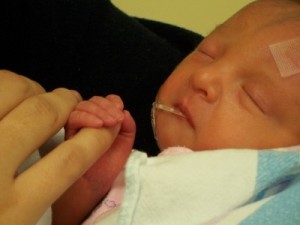 The results of a recent survey of parents of children with disabilities ran cross-grain to the mentality that characterizes our society’s culture of death. Published in the medical journal Pediatrics, the survey included parents of 272 children suffering from the extreme genetic conditions Trisomy 13 and Trisomy 18—conditions where a child is born with an extra 13 or 18 chromosome. Only about 21% of children born with one of these conditions live to five years old.
The results of a recent survey of parents of children with disabilities ran cross-grain to the mentality that characterizes our society’s culture of death. Published in the medical journal Pediatrics, the survey included parents of 272 children suffering from the extreme genetic conditions Trisomy 13 and Trisomy 18—conditions where a child is born with an extra 13 or 18 chromosome. Only about 21% of children born with one of these conditions live to five years old.
Increasingly, members of the medical community have embraced a “quality of life” ethic rather than a “sanctity of life” ethic, and doctors don’t have a favorable opinion of children affected with Trisomy 13/18. Parents in this survey reported that 57% of doctors told them that their unborn child would live a life of suffering, and 23% even went so far as to say that the child would ruin their family.
The doctors were flat wrong. Ninety-seven percent of the 332 parents surveyed said their child was happy, and the majority said that caring for their child has enriched their lives.
This response flies in the face of the prevailing view of our disposable man age. The proponents of “death as a solution to our social problems” would have us believe that the lives of such children are not worth living. They tell us that such children will not have a high enough quality of life to warrant their continued survival and they will be an undue “burden” on others.
These pro-death advocates overlook several key aspects of the lives of the disabled. First, they ignore the intrinsic worth and value of human life. All people are made in the image of God, including the disabled. As a consequence, all human beings have inherent dignity and value, including the disabled. The “worth” of these people is unaffected by disability or infirmity. Those who would destroy the lives of the disabled embrace a cheap view of the value of life and employ a sliding scale of value that equates worth with functionality.
Second, the proponents of death ascribe little to no “meaning” to the lives of the disabled. But meaning is in the eyes of the beholder and the disabled often attach more meaning to their own lives than the onlookers who are quick to write them off. Many people with disabilities have fulfilling, happy lives, and are a blessing to those around them. Just because they do not fit a utilitarian standard that embraces some arbitrary level of intelligence or capacity for physical performance does not mean their lives are any less meaningful to them or those around them.
Third, those who advocate the destruction of the disabled fail to appreciate all that the disabled can teach the rest of us about the meaning of life. Those with disabilities teach us what it means to care for and serve the less fortunate. They teach us not to take our own health for granted. They teach us what a great blessing it is to give to others. And they often take delight in the simple joys of life that those of us who are blessed with good health sometimes overlook.
Sadly, a large proportion of unborn children diagnosed with disabilities are aborted before they ever have a chance to live out their lives. They are aborted because of the recommendations of a utilitarian medical establishment that has embraced a cheap view of human life. They are aborted because we have become a self-seeking culture that can’t be “bothered” by the lives of the disabled.
Our society needs to regain respect for human dignity and the sanctity of human life. Human life is precious, not because of what we can do, but because of who we are—creatures made in the image of God. The imago dei is undiminished by disability or infirmity. On the contrary, the Lord of the universe identified himself closely with those in need. (Matt. 25:40) We have no right to destroy this image, be it our own life or the lives of others.
Our society has much to learn from the disabled. We must not sacrifice their lives on the altar of pride and selfishness. We need their influence desperately.



